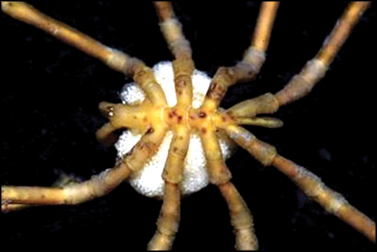 A
city of brittle stars off the coast of New Zealand, an Antarctic
expressway where octopuses ride along in a flow of extra salty water and
a carpet of tiny crustaceans on the Gulf of Mexico sea floor are among
the wonders discovered by researchers compiling a massive census of
marine life.
"We are still making discoveries," but researchers are also busy
assembling data already collected into the big picture of life in the
oceans, senior scientist Ron O'Dor said.
The fourth update of the census was released ahead of a meeting of
hundreds of researchers that began in Valencia, Spain. More than 2,000
scientists from 82 nations are taking part in the project, which is to
be completed in 2010.
A discovery that delights O'Dor is that many deep-ocean octopuses
share an Antarctic origin. As the Antarctic got colder, ice increased
and octopuses were forced into deeper water, he said in a telephone
interview.
Salt and oxygen are concentrated in the deeper waters, he said. This
dense water then flows out, carrying along the octopuses that have
adapted to the new conditions, enabling them to spread to deep waters
around the world.
Deep-water octopuses worldwide, he pointed out, lack the ink sack
that allows their shallow-water cousins to shoot out a camouflage
screen.
 |
| A male sea spider carries
its eggs on especially adapted appendages under its body.
Pic: Reuters |
After all, if they live where it is dark, ink is unnecessary, said
O'Dor, a Canadian member of the research team.
Patricia Miloslavich, a senior scientist from Venezuela, is pleased
with the newly discovered molluscs, from snails to cuttlefish to squids.
Once the census is complete, the plan is to publish three books: a
popular survey of sea life, a second book with chapters for each working
group and a third focusing on biodiversity.
O'Dor also said researchers are working with the online scientific
journal PLoS ONE, which is open to anyone and thus would make the
results readily available.
Scientists at the sessions were to hear about the discovery of what
the researchers call a brittle star city off the coast of New Zealand.
The brittle stars, animals with five arms, have colonised the peak of a
seamount - an underwater mountain - where the current flows past at
about 2.5 miles per hour. The current delivers such an ample food supply
that thousands of stars can capture food simply by raising their arms.
Researchers found a carpet of small crustaceans inhabiting the head
of the Mississippi Canyon in the Gulf of Mexico. There are as many as
12,000 of these small crustaceans per square yard.
-AP
|

